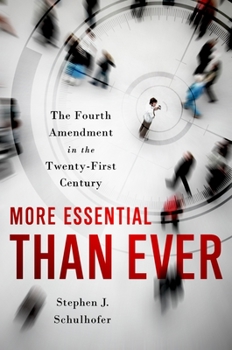More Essential Than Ever: The Fourth Amendment in the Twenty First Century
Select Format
Select Condition 
Book Overview
When the states ratified the Bill of Rights in the eighteenth century, the Fourth Amendment seemed straightforward. It requires that government respect the right of citizens to be "secure in their persons, houses, papers, and effects, against unreasonable searches and seizures." Of course, "papers and effects" are now digital and thus more vulnerable to government spying. But the biggest threat may be our own weakening resolve to preserve our privacy. In...
Format:Hardcover
Language:English
ISBN:0195392124
ISBN13:9780195392128
Release Date:August 2012
Publisher:Oxford University Press
Length:216 Pages
Weight:0.75 lbs.
Dimensions:0.9" x 5.6" x 8.3"
Customer Reviews
0 rating





